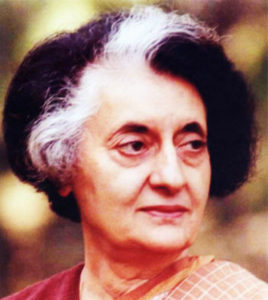Why do people elect a strong leader? – deciphering voters’ psychology
The World Sikh News reproduces English translation of Punjabi Tribune editorial by its editor Swarajbir Singh, published on 24 May 2019 -a day after the declaration of India’s general election results, explaining the voters’ psychology of mandate to Indian Prime Minister Narendra Modi and his ilk.
![The World Sikh News reproduces English translation of Punjabi Tribune editorial by its editor Swarajbir Singh, published on 24 May 2019 -a day after the declaration of India’s general election results, explaining the voters’ psychology of mandate to Indian Prime Minister Narendra Modi and his ilk. WHEN London Business School dons, Hemant Kakkar and Niro Sivanathan, came up with their 2017 research paper, “When the appeal of a dominant leader is greater than a prestige leader,” it made significant waves. […]](https://www.theworldsikhnews.com/wp-content/uploads/2019/05/Modi-360x192.jpg)
WHEN London Business School dons, Hemant Kakkar and Niro Sivanathan, came up with their 2017 research paper, “When the appeal of a dominant leader is greater than a prestige leader,” it made significant waves.
Intrigued by a very Punjabi-sounding surname Kakkar, I fired on a whim an email seeking access to the entire research paper and the deductions the authors had made thereof. It was based on a survey carried out in 2016, a year before the paper hit academia.
The authors wanted to study a number of phenomena, including the advent of Chinese nationalism, rise of populist authoritarian leaders who are overbearing in their narrative, including the rise of Narendra Modi in India, the traction which saw Donald Trump catapulted to American presidency, the force majeure exhibited by leaders who ride upon populist slogans and beat the drums of nationalism for the unwashed masses.

Kakkar and Sivanathan primarily surveyed two kinds of leaders: dominant/authoritarian leaders who are aggressive in behaviour and often exhibit questionable moral character, and prestige leaders whose personality traits shun aggression for sagacity, humility and a measured approach.
Surely, such surveys were not new. The largest exercise of this kind was undertaken in the 1940s, during and shortly after World War II, by a team of researchers of the University of California, Berkeley, which included Theodor W. Adorno, a highly regarded psychologist known for his critical theory of society.

It was to be followed by the publication of The Authoritarian Personality (1950) that explained why, when the going gets tough, people prefer dictatorial leaders and proactively shun logical, rational and sagacious ones.
The Authoritarian Personality triggered much debate, primarily because it sought to collate the principles enunciated by Karl Marx and the theory of Sigmund Freud in the same box and argued that authoritarianism was the result of a Freudian developmental model. The Authoritarian Personality, with the Holocaust as its impetus, proved to be highly influential in the field of social sciences and psychology worldwide, prompting many other similar academic ventures.
Prominent research in this strain was carried out by Bob Altemeyer, who was then a Professor of Psychology at the University of Manitoba. He produced a test and scale to measure and understand right-wing authoritarianism. His research is extensively documented in the book, The Authoritarians (2006).
Kakkar and Sivanathan’s work takes forward the work of their predecessors along the same lines. They inferred that when faced by the situational threat of economic uncertainty (as exemplified by the poverty rate, the housing vacancy rate, and the unemployment rate), people escalate their support for dominant leaders who they see as more decisive and determined; who puts forward his narrative more effectively and authoritatively; whose persona exudes dominance and influence.
It matters little, the research showed, what means the leader adopts in achieving his objectives. The survey offered important theoretical explanations for why, around the globe from the United States and Indian elections to the Brexit campaign, constituents continue to choose authoritarian leaders over other admired/respected leaders.
A part of Kakkar and Sivanathan’s research was carried out during the 2016 American presidential campaign.



As per this survey in which participants indicated their voting preference for Donald Trump, Hillary Clinton, or neither, the sections of the populace that were more worried about unemployment and economic uncertainty in the future betrayed a marked preference for Donald Trump. A dislike for both Trump and Hillary came next and a preference for just Hillary Clinton was the third choice.
The survey effectively showed that when a country witnesses large scale unemployment and economic uncertainty, it increases the preference for a dominant leader as opposed to a prestigious leader because want someone who can take tough decisions and execute them, or claims he has the willingness to do so.
With a rise in economic uncertainty, a sense of apprehension drives the underlying psychological fears.
With no jobs in sight, people not only face economic onslaught but also a psychological assault.
Such people want a semblance of a crutch, of any form of support. This can only come from a leader who is seemingly powerful, who peddles his narrative loudly and with much authority, can spew slogans and deploy language which could play on the people’s innermost fears and stoke their sense of uncertainty.
History is witness to the fact that mass psychology and subconscious remain under the effect of dominant leaders for a long, long time.
What kind of a game is this? A game that never ends those fears, but stokes these further. A strong leader encroaches upon the entire mind space and successfully peddles the idea that he is the messiah who will end fears, apprehensions and uncertainty. The language of prudence and sagacity does not cut any ice. What works is a narrative of incitement, elements that further stoke the fires of fear, apprehension and uncertainty, false formulations that feed upon the majoritarian bigotry and the ability of the leader to portray himself as the biggest, strongest, shrewdest one who will not flinch from sacrifice when need be.
Kakkar and Sivanathan also ran another survey as part of their research in which people in certain American towns were given a scenario study in which participants were told about a possible terrorist attack in a small US town. They were told that while local authorities were certain that such an attack would occur, they had little idea about where and when and so were in no position to assure the people if they will be able to prevent it but will definitely try their level best to do so.
The participants thus informed were asked to indicate what kind of leader they would like to see elected as their president given the possibility of such attacks, and their unambiguous answer was Donald Trump. Clearly, when people are struck with fear, they choose a dominant leader over a prestige leader.
History is witness to the fact that mass psychology and subconscious remain under the effect of dominant leaders for a long, long time.
In the second half of the last century, Indira Gandhi and Margaret Thatcher come to mind as two prime examples of this phenomenon.
Indira Gandhi fashioned herself as a leader who could take tough calls. She remained prime minister for 15 years (1966-1977 and 1980-84).
Indira Gandhi fashioned herself as a leader who could take tough calls. She remained prime minister for 15 years (1966-1977 and 1980-84).
She made the biggest blunder of her political life by imposing Emergency and consequently lost the 1977 election.
Till date, the Emergency era is recalled as a blot on the country’s political history but the Janta Party that came to power in 1977 could not run the government with any amount of efficacy and the very same people who had thrown out Indira Gandhi in 1977 brought her back in 1980.
Margaret Thatcher defeated the Labour Party thrice and ruled for almost eleven and a half years.
In her initial years at the helm, she took decisions against migrants, effected cuts in public spending on welfare measures and projected herself as a tough leader. Britain witnessed demonstrations where she was vilified as ‘Margaret Thatcher, Milk Snatcher’ but she continued her winning streak.
These examples and surveys tell the story of what persuasions and causes go into the making of an electorate’s mind.
The latest election results merely vindicate the narrative that the carefully crafted persona of Prime Minister Narendra Modi and the discourse built around Nationalism and the attacks on Balakot have impacted the voting behaviour to a massive extent.
Bhartiya Janata Party has won even more seats than its 2004 tally even though pundits had predicted the 282-seat bar set in 2014 as the peak that could not have been surmounted. Parties allied with the BJP have also gained as a result of their association and the NDA is likely to hover around 350.
In any democracy, the role and responsibility of the Opposition is no less important than that of the ruling side.
The latest election results merely vindicate the narrative that the carefully crafted persona of Prime Minister Narendra Modi and the discourse built around Nationalism and the attacks on Balakot have impacted the voting behaviour to a massive extent.
The Congress party, that had started dreaming big following its victory in Chhatisgarh, Madhya Pradesh and Rajasthan, would not only have to play the role of the opposition but will also have to wage a battle and do some serious introspection to stem further atrophy.
The next five years will be decisive for India’s democracy. These are the years that will put to test India’s Opposition as to whether it can play any constructive role or remains a scattered force as it happened in the previous five years.

One thought on “Why do people elect a strong leader? – deciphering voters’ psychology”